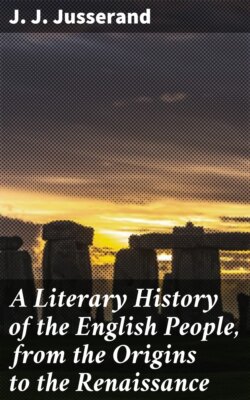Читать книгу A Literary History of the English People, from the Origins to the Renaissance - J. J. Jusserand - Страница 4
На сайте Литреса книга снята с продажи.
ОглавлениеNo wonder if the descendants of these indefatigable inventors are men with rich literatures, not meagre literatures of which it is possible to write a history without omitting anything, but deep and inexhaustible ones. The ends of their golden chains are not to be seen. And if a copious mixture of Celtic blood flows, though in different proportions, in the veins of the French and of the English, it will be no wonder if they happen some day to produce the greater number of the plays that are acted, and of the novels that are read, all over the civilised world.
III.
After a second journey, during which he passed the Thames, Cæsar departed with hostages, this time never to return. The real conquest took place under the emperors, beginning from the reign of Claudius, and for three centuries and a half Britain was occupied and ruled by the Romans. They built a network of roads, of which the remains still subsist; they marked the distances by milestones, sixty of which have been found, and one, at Chesterholm, is still standing; they raised, from one sea to the other, against the people of Scotland, two great walls; one of them in stone, flanked by towers, and protected by moats and earth-works.[21] Fortified after the Roman fashion, defended by garrisons, the groups of British huts became cities; and villas, similar to those the remains of which are met with under the ashes of Pompeii and in the sands of Africa, rose in York, Bath, London, Lincoln, Cirencester, Aldborough, Woodchester, Bignor, and in a multitude of other places where they have since been found. Beneath the shade of the druidical oaks, the Roman glazier blew his light variegated flasks; the mosaic maker seated Orpheus on his panther, with his fingers on the Thracian lyre. Altars were built to the Roman deities; later to the God of Bethlehem, and one at least of the churches of that period still subsists, St. Martin of Canterbury.[22] Statues were raised for the emperors; coins were cast; weights were cut; ore was extracted from the mines; the potter moulded his clay vases, and, pending the time when they should be exhibited behind the glass panes of the British Museum, the legionaries used them to hold the ashes of their dead.
However far he went, the Roman carried Rome with him; he required his statues, his coloured pavements, his frescoes, his baths, all the comforts and delights of the Latin cities. Theatres, temples, towers, palaces rose in many of the towns of Great Britain, and some years ago a bathing room was discovered at Bath[23] a hundred and eleven feet long. Several centuries later Gerald de Barry passing through Caerleon noticed with admiration "many remains of former grandeur, immense palaces … a gigantic tower, magnificent baths, and ruined temples."[24] The emperors could well come to Britain; they found themselves at home. Claudius, Vespasian, Titus, Hadrian, Antoninus Pius came there, either to win the title of "the Britannic" or to enjoy the charms of peace. Severus died at York in 211, and Caracalla there began his reign. Constantius Chlorus came to live in this town, and died there; and the prince destined to sanction the Romans' change of religion, Constantine the Great, was proclaimed emperor in the same city. Celtic Britain, the England that was to be, had become Roman and Christian, a country of land tillers who more or less spoke Latin.[25]
But the time of transformation was drawing nigh, and an enemy was already visible, against whom neither Hadrian's wall nor Antoninus' ramparts could prevail; for he came not from the Scottish mountains, but, as he himself said in his war-songs, "by the way of the whales." A new race of men had appeared on the shores of the island. After relating the campaigns of his father-in-law, Agricola, whose fleet had sailed around Britain and touched at the Orkneys, the attention of Tacitus had been drawn to Germany, a wild mysterious land. He had described it to his countrymen; he had enumerated its principal tribes, and among many others he had mentioned one which he calls Angli. He gives the name, and says no more, little suspecting the part these men were to play in history. The first act that was to make them famous throughout the world was to overthrow the political order, and to sweep away the civilisation, which the conquests of Agricola had established amongst the Britons.
